
as Brünnhilde in DIE WALKÜRE:
"Caroline Whisnant’s… vivid phonation and her shining top notes made her a Brünnhilde of vocal brilliance which has become rather rare today." (Die Rheinpfalz)
"The second act with its two catastrophes and Wotan’s long soliloquy as part of his dialogue with Brünnhilde stayed on its exceptionally high artistic level due to the performance of the very strong Caroline Whisnant." (BNN)
"Caroline Whisnant gives a perfect portrait of Brünnhilde. She impressively shows the character’s change from the rather unencumbered favorite daughter, becoming her father’s confidante, to a woman of independent judgment and action." (Badisches Tagblatt)
in the title role of ELEKTRA:
FRANKFURT:"Convincing soul agony--Caroline Whisnant triumphs as Elektra in Frankfurt"
"The outstanding achievement of this revival of course was Caroline Whisnant’s Elektra. The Soprano, whom the Frankfurt public still remembers as Guiseppe Verdi’s Lady Macbeth, does not only give us a display of enormous physical stamina throughout two operatic hours without intermission. She seems to have properly internalized all of Elektra’s mental turmoil, showing it even in the smallest mimic and gestic detail. She wins over her public by virtue of the expressiveness and directness of her singing rather than with the production of beautiful tones – in this role the correct approach: This is a part where soprano-force may erupt in fierceness, in rage, also in ecstasy. Allthough it must be said, that Whisnant is also doing an excellent job in the soft, deceptively sweet moments, for example in the Elektra’s dialogue with her mother. For this exceptional performance she received well deserved enthusiastic ovations at the end." (Axel Zibulski, Offenbach-Post)
"The cynosure of the performance was the Frankfurt Debut of Caroline Whisnant in the title role (who already sang Lady Macbeth): in a heart-rending portrayal of the part she combined the call for unforgiving vengeance with an insatiable desire for a more beautiful life, as well as moments of rejoicing with the darkness of death and an inescapable mourning for a lost happiness. Her opulent voice, encompassing a secure and shimmering top, wonderfully synthesize these different facets of the wild tragedian and the lonely young woman." (Rudolf Jöckle, Frankfurter Neue Presse)
"Now Caroline Whisnant finally lost her mind. If the soprano sang the Lady Macbeth still rightly to cultivated insanity, almost a little too moderately and pretty, last month in the opera Frankfurt, now, as Elektra, she brings a true nightmare onto the stage." (Stefan Schickhaus, Frankfurter Rundschau)
"Caroline Whisnant is now the Elektra, and the way she nurses her father’s gleaming axe, you would not want to meet her in a dark alley. Her voice possesses stupendous carrying power and it seems to as shining and polished as the axe." (Stefan Schickhaus, Frankfurter Rundschau)
"Newly cast, Caroline Whisnant did the title role. In exemplary fashion she translated the shyness of a wild animal, radical appetence for vengeance and a residue of repressed tenderness in dealing with her brother Orest into a wide spectrum of body language and vocal colors spanning form expansive radiant power to piano nuances." (Ellen Kohlhaas, Frankfurter Allgemeine Zeitung)
KARLSRUHE:
"In the b-premiere Caroline Whisnant faced the challenge to be scarcely two hours long continuously present as Elektra, meaning not only being on stage.
"Caroline Whisnant’s Elektra acts calmer and more controlled, but no less scary. In dealing with the hated mother, Klytämnestra, Whisnant’s Elektra lurks on every sign of the weakness of her counterparts. Very successful is her reunion with the dead lost brother Orest. The way she clings to his hand and her shock about her state of neglect when he wants to embrace her is very touching and shows us Elektra’s character from another side. Whisnant’s dramatic soprano also carries over the places in which the Badische Staatskapelle revels in symphonic sonority, and it has the required enormous scale from bright top notes to a round depth." (Nike Luber, BNN)
"Elektra was this time Caroline Whisnant: a Soprano, who knew to connect clearly sharp diction with expressive gestures. Her role was anything but one-dimensional. It also showed the vulnerable aspects of the character in differentiated tones to advantage, without losing intensity in the big emotional eruptions." (Karl Georg Berg, Die Rheinpfalz)
as Färberin in DIE FRAU OHNE SCHATTEN:
"His wife was, as in Mannheim, Caroline Whisnant. With intense acting and a full, where necessary even bickering, soprano voice, she equipped the role of the Dyer’s Wife. Her long held Spitzenton at 'Oh Welt in der Welt …' would have earned scene applause, if were permitted with a through-composed opera..." (Kaspar Sannemann, art-tv)
"Among the women Caroline Whisnant’s Dyer’s Wife dominated the the scene. Precise in her parlando and overwhelmingly strong in dramatic passages, she was always master of her high tones and overcame the murderous role without fatigue." (Andreas Schubert, www.klassik.com)
"Caroline Whisnant as the Dyer’s Wife was able to over-shine even the strongest orchestra attacks with admirable metallic dynamics." (Badische Neueste Nachrichten)
"Caroline Whisnant sings the Dyer’s Wife as naturally as she would speak. She hisses at her unsophisticated husband and dreams in bright tones of a better life." (Badisches Tagblatt)
"Caroline Whisnant certified these inner struggles of the Dyer’s Wife a large, strong and brilliant voice …" (Die Rheinpfalz)
"Caroline Whisnant lets her Soprano shine dramatically and gives a Dyer’s Wife, who is almost despairing over her internal dichotomy, rich facets." (Mannheimer Morgen)
"Caroline Whisnant as the Dyer’s Wife soared above the orchestra; her voice displayed power and radiance in the higher notes of her middle register." (Reiner Knäbel, Opera)
“...soprano Caroline Whisnant is radiant as Norma. Her incredible vocal techniques are equaled by her mesmerizing acting abilities to make this portrayal not only dramatically convincing but musically beautiful beyond belief. It is a performance of consummate artistry from beginning to end and simply spectacular to behold.” (Des Moines Register)
“NORMA at DMMO was one of the best performances ever in Des Moines, with Caroline Whisnant as [Norma]. Whisnant made one of the most difficult scores in all opera a huge hit in Indianola.” (cityview, Des Moines)
“Caroline Whisnant showed that she had the high notes, the coloratura, the fine spun pianissimi and the dramatic force to be a commanding Norma.” (Opera Japonica)
in the title role of TURANDOT:
“Appearing haughty and demanding from high atop her tower, Caroline Whisnant unsheathed her formidable voice on the jagged lines of "In questa reggia" ("Within this palace"). She had power and enough steel to cut through the orchestra, but she also went beyond the big moments, offering creamy tone for intimate phrases.” (The Oregonian, Portland)
“Finally, Caroline Whisnant is riveting as Princess Turandot. As her icy, haughty elegance melts into fervent ardor, her voice gains a magnificent radiance.” (Des Moines Register)
“Put simply, Caroline Whisnant’s Turandot and Sally Dibblee’s Liu are as fine a pairing as you are likely to find in such a piece...As for Whisnant, the challenge of singing initially from several dozen feet in the air merely confirmed utter technical confidence. Her cruelly exposed notes came out dead on pitch, often at astounding volume.” (Courier-Journal, Louisville, Kentucky)
in the title role of TOSCA:
“...the soprano’s beautiful young diva displayed every emotion expected of her...Whisnant’s voice possesses a rich bloom capable of conveying Tosca’s volatile personality, combined with expressive gestures.” (Opera News)
“Soprano Caroline Whisnant completely inhabited the title role both dramatically and vocally. Alternately coy, vulnerable, and passionate, Whisnant demonstrated at every turn that she knew exactly what she was singing -- and why. Hers is a large voice with complete ease at the top but an equally powerful chest tone. She manifested a fine control of dynamics and passagework from an exquisite balance of forte and pianissimi in her second act "Vissi d'Arte" to her increasing outbursts of jealousy in Act 1. And rarely has this reviewer seen two linchpin moments performed as unstudied but dramatically plausible as in this performance: The first, when Tosca first glimpses the knife on Scarpia's table, hesitates to use it, but ultimately does so; the second was her transition from relieved joy to growing horror when she discovers that her lover's execution is not bogus.” (Ithaca Journal)
“...in Act I of TOSCA, Whisnant played the vocalist’s temperamental flare-ups and persistent jealousy with ease...Whisnant’s ‘Vissi d’arte’ —Tosca’s autobiographical song about dedication to art, faith, and charity —was full of velvety melodic lines and secure high notes, deserving its 45 seconds of applause.” (The Commercial Appeal, Memphis, Tennessee)
in the title role of FIDELIO:
“Beethoven opera ‘FIDELIO’ soars, thanks to soprano Whisnant.” (Des Moines Register)
“...it is a dramatic soprano voice such as Whisnant’s, powerful and tonally beautiful, that made it possible for Artistic Director Robert L. Larsen’s festival to stage the piece for the first time in the company’s 26 seasons.” (Des Moines Register)
in the title role of VANESSA:
“Caroline Whisnant has a glorious, all-knowing instrument that can deliver rage when betrayed or perversion when tempted. The high point of this performance was at Vanessa’s realization that Erika was still alive, the single word ‘Yes!’ repeated unaccompanied in Whisnant’s thrilling upper-middle range.” (Opera News)
“Soprano Caroline Whisnant’s voice and persona were ideal for the role of Vanessa, just as [Des Moines Metro Opera’s Artistic Director Robert] Larsen had described her. Throughout the performance, she has tremendous control over her powerful and extremely beautiful voice, varying it to every emotional circumstance in the twisty plot.” (Omaha World-Herald)
"In the role of Vanessa, soprano Caroline Whisnant met the technical challenges of this music with great aplomb. Her voice is ravishingly glorious in all its registers, and she gives a dramatic and musical performance that is nearly flawless. Such a performance would be negligent to miss." (Des Moines Register)
“In the title role, Caroline Whisnant met the vocal and physical challenges of her role with smooth legato singing and expert stagecraft.” (Opera Japonica)
as Leonora in IL TROVATORE:
“Caroline Whisnant impresses the audience with the poignancy and betrayal of her characterization and fills the house with the splendor of her brilliant voice.” (Des Moines Register)
as Desdemona in OTELLO:
"Caroline Whisnant was in compelling, silvery voice as Desdemona, bringing lots of subtle shadings to the love duet.” (Baltimore Sun)
as Senta in DER FLIEGENDE HOLLÄNDER:
“...displayed vibrant, focused tone throughout her range; neither the ballad’s register jumps nor the high Bs in the love duet and finale posed the least threat to her vocal security.” (Opera News)
“...acted the role very convincingly and has a voice capable of fine-lined purity on the one hand, and a soaring heroic quality on the other. Wagner’s score requires both extremes of this role and Whisnant met the challenges exceptionally well...” (Buffalo News)
as Santuzza in CAVALLERIA RUSTICANA:
“...with a voice capable of a scorching blaze...” (Kansas City Star)
as Maddalena de Coigny in ANDREA CHÉNIER:
“...she sang arrestingly —with big, brilliant tone where needed, elsewhere with a ravishing, quiet creaminess.” (Kansas City Star)
as Madame Lidoine in LES DIALOGUES DES CARMÉLITES:
“her polished tone conveyed the dignity of Madame Lidoine, as well as her steadfast faith in times of crisis.” (The Tulsa World)
as Mimi in LA BOHÈME:
“...played her with appealing innocence. She sang ‘Mi chiamano Mimi’ in sad, fluty tones, brightening at a reference to the springtime sun. Her third and fourth act arias were full of tenderness.” (The Commercial Appeal, Memphis, Tennessee)
as Donna Elvira in DON GIOVANNI:
“Whisnant blends passion with rage, achieving power without sacrificing tone.” (Des Moines Sunday Register)
as Rosalinda in DIE FLEDERMAUS:
“...chance to appreciate the creamy Rosalinda of soprano Caroline Whisnant.” (Courier-Journal, Louisville, Kentucky)
Wagner Gala Concert
“Whisnant opened the program as the triumphant Brunhilde at the opening of "Die Walkure" and closed it as the sadder but wiser Brunhilde immolates herself as "Gotterdammerung" winds down. She is a truly larger-than-life figure, as Brunhilde must be, with a voice to match and a dramatic presence that commands attention. Her low range has a contralto-like richness and the top of her voice is both powerful and smooth.” (The Washington Post)
Verdi OPERA GALA:
“the evening’s standout...a commanding, dramatic voice with a bright, penetrating edge. Whisnant demanded the audience’s attention, not only in the powerful exhortations of ‘Vieni! T’affretta,’ from MACBETH, but in the cool sotto voce passages of ‘Più tranquilla,’ from LA FORZA DEL DESTINO.” (Birmingham News)
OPERA GALA for the Italian Olympic athletes
“The Italian athletes didn’t shy away from showing their preferences from the program. With cries of ‘Brava!’ they clapped loud and long, arms raised in the air after Ms. Whisnant sang the ‘Vissi d’arte’ from Puccini’s TOSCA.” (Winston-Salem Journal)
OPERA GALA:
“Is there anything Whisnant can’t do? Certainly she demonstrated that Mozart, Verdi, Puccini, and his contemporaries are within her grasp. In a few years, I wouldn’t be surprised to read that she had been cast in the title role of Bellini’s NORMA.” (Indianapolis News)
concert performance in the title role of FIDELIO
“Soprano Caroline Whisnant, in the title role, projected a big, polished voice, at once warm and bright...bloomed beautifully...with gleaming solidly placed high notes and a radiant middle.” (San Antonio Express-News)
concert performance as Sieglinde in DIE WALKÜRE / Act I:
“Her voice and manner combine Wagnerian heft and maturity with suggestions of vulnerability and adolescent passion, an ideal combination in a Sieglinde, whose human qualities distinguish her from Brünnhilde, the warrior goddess who becomes the romantic heroine for the rest of the ‘RING.’” (
concert performance as Cleopatra in
ANTONY AND CLEOPATRA excerpts
“Whisnant’s powerful, exquisite voice is well equipped to convey Cleopatra’s seductiveness, even in her despair and death.” (Spokesman Review, Spokane, Washington)
Elektra & Brünnhilde photographs by Jacqueline Krause-Burberg. © 2006.
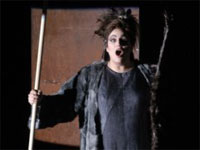
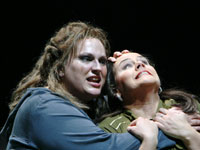
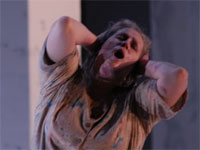
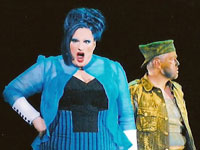
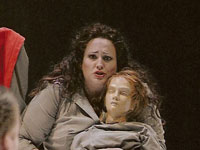
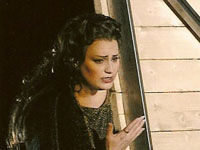
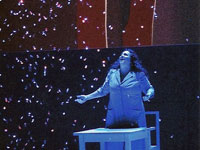
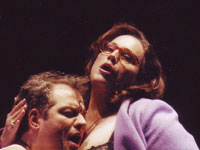
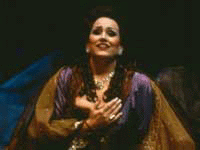
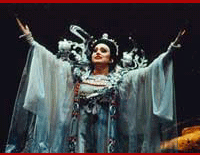
biography | repertoire | reviews | schedule | photos | contact | home
For more information: info@carolinewhisnant.com
© Caroline Whisnant, 2004-2011
.
Designed and maintained by YourType
Digital Design
Last updated
February 10, 2011